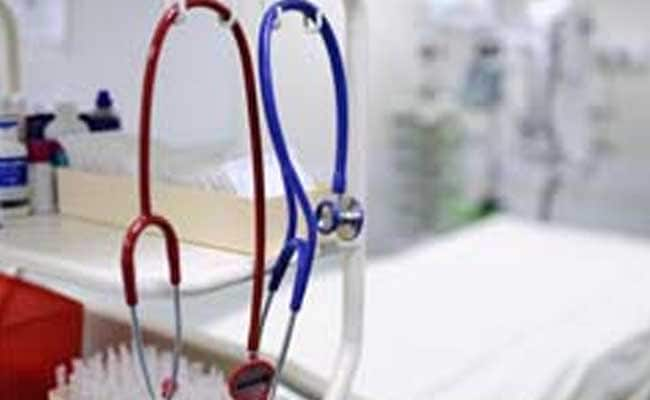
The patient was told about her medical problem which could be solved with IVF surrogacy.
New Delhi:
A 29-year-old female having a rare medical problem -- in which patients have an underdeveloped vagina and uterus -- was able to conceive through IVF surrogacy at a city hospital in New Delhi, doctors said on Friday.
Anjana Dubey had Mayer-Rokitansky-Küster-Hauser (MRKH) syndrome, a condition that causes the vagina and uterus to be underdeveloped or absent. Affected women usually do not have menstrual periods due to the absent uterus.
Unaware of her own health condition, Mrs Dubey was unable to conceive despite being married for one and a half years. During consultation with the doctor Mrs Dubey was told about her medical problem and also told that it could easily be solved through IVF surrogacy.
MRKH syndrome affects one in 5,000 women.
"In our patient's case there was no uterus with both ovaries in the iliac fossa along with a single pelvic kidney. On per-speculum examination, there was a blind and short vagina with absent cervix," said Arvind Vaid at the Indira IVF centre.
Explaining the medical condition, Mr Vaid said: "These women usually witness primary amenorrhea (not menstruating) and doctors find that they have no vagina, cervix or uterus (womb) during puberty."
"Though they do develop breasts and pubic hair, this is because the ovaries produce female hormones that make normal development occur, but the absence of vagina and uterus mean that there are no periods," he added.
He said that most women seek advice about this when they are 15 or 16 years old. However, some women find out after having difficulties with sexual intercourse. Infertility is one of the biggest problems with such women.
Talking about the IVF surrogacy concept, Mr Vaid said : "In this, their eggs can be extracted and fertilised by their partner's sperm and then placed in another woman's (surrogate mother) uterus. This is known as IVF surrogacy and the baby will genetically be theirs."
"Therefore, we suggested to Anjana Dubey and her husband to undergo IVF with a surrogate with self eggs. The couple willingly agreed and the patient underwent laparoscopic retrieval of eggs with retrieval of 6 oocytes, of which 5 were M2 stage. Finally, we transferred 3 embryos inside the surrogate mother and 15 days later she was confirmed to be pregnant and is currently under treatment at our centre."
According to Mr Vaid, prior to the advent of reliable IVF and access to carefully selected gestational carriers, women with MRKH Syndrome were unable to have their own genetic offspring.
"Now there is real hope and opportunity for them as well as many others with absence or reproductive incompetence of the uterus," he said.
Anjana Dubey had Mayer-Rokitansky-Küster-Hauser (MRKH) syndrome, a condition that causes the vagina and uterus to be underdeveloped or absent. Affected women usually do not have menstrual periods due to the absent uterus.
Unaware of her own health condition, Mrs Dubey was unable to conceive despite being married for one and a half years. During consultation with the doctor Mrs Dubey was told about her medical problem and also told that it could easily be solved through IVF surrogacy.
MRKH syndrome affects one in 5,000 women.
"In our patient's case there was no uterus with both ovaries in the iliac fossa along with a single pelvic kidney. On per-speculum examination, there was a blind and short vagina with absent cervix," said Arvind Vaid at the Indira IVF centre.
Explaining the medical condition, Mr Vaid said: "These women usually witness primary amenorrhea (not menstruating) and doctors find that they have no vagina, cervix or uterus (womb) during puberty."
"Though they do develop breasts and pubic hair, this is because the ovaries produce female hormones that make normal development occur, but the absence of vagina and uterus mean that there are no periods," he added.
He said that most women seek advice about this when they are 15 or 16 years old. However, some women find out after having difficulties with sexual intercourse. Infertility is one of the biggest problems with such women.
Talking about the IVF surrogacy concept, Mr Vaid said : "In this, their eggs can be extracted and fertilised by their partner's sperm and then placed in another woman's (surrogate mother) uterus. This is known as IVF surrogacy and the baby will genetically be theirs."
"Therefore, we suggested to Anjana Dubey and her husband to undergo IVF with a surrogate with self eggs. The couple willingly agreed and the patient underwent laparoscopic retrieval of eggs with retrieval of 6 oocytes, of which 5 were M2 stage. Finally, we transferred 3 embryos inside the surrogate mother and 15 days later she was confirmed to be pregnant and is currently under treatment at our centre."
According to Mr Vaid, prior to the advent of reliable IVF and access to carefully selected gestational carriers, women with MRKH Syndrome were unable to have their own genetic offspring.
"Now there is real hope and opportunity for them as well as many others with absence or reproductive incompetence of the uterus," he said.
Track Latest News Live on NDTV.com and get news updates from India and around the world

